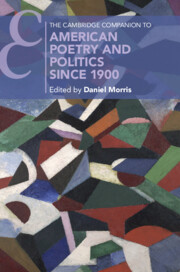Book contents
- The Cambridge Companion to American Poetry and Politics since 1900
- The Cambridge Companion to American Poetry and Politics since 1900
- Copyright page
- Contents
- Notes on Contributors
- Acknowledgments
- Introduction
- Chapter 1 The Space of Public Memory
- Chapter 2 Poetry and Propaganda
- Chapter 3 Depression-Era Poetics and the Politics of How to Read
- Chapter 4 The Politics and Poetics of Revolution
- Chapter 5 Wallace Stevens, Stanley Burnshaw, and the Defense of Poetry in an Age of Economic Determinism
- Chapter 6 The Line of Wit
- Chapter 7 US Poets on War and Peace
- Chapter 8 Institutions of American Poetry
- Chapter 9 African American Political Poetries
- Chapter 10 Our Terribly Excluded Blue
- Chapter 11 Poetry and the Prison Industrial Complex
- Chapter 12 “Oh Say Can You See”
- Chapter 13 The Political Resonances of Hip Hop and Spoken Word
- Chapter 14 Language as Politics in Twentieth- and Twenty-First-Century American Poetry
- Chapter 15 Renovating the Open Field
- Chapter 16 Transcultural Agency
- Chapter 17 Ecopoetry Now
- Chapter 18 The Politics and History of Digital Poetics
- Index
- Cambridge Companions to …
- References
Chapter 5 - Wallace Stevens, Stanley Burnshaw, and the Defense of Poetry in an Age of Economic Determinism
Published online by Cambridge University Press: 27 April 2023
- The Cambridge Companion to American Poetry and Politics since 1900
- The Cambridge Companion to American Poetry and Politics since 1900
- Copyright page
- Contents
- Notes on Contributors
- Acknowledgments
- Introduction
- Chapter 1 The Space of Public Memory
- Chapter 2 Poetry and Propaganda
- Chapter 3 Depression-Era Poetics and the Politics of How to Read
- Chapter 4 The Politics and Poetics of Revolution
- Chapter 5 Wallace Stevens, Stanley Burnshaw, and the Defense of Poetry in an Age of Economic Determinism
- Chapter 6 The Line of Wit
- Chapter 7 US Poets on War and Peace
- Chapter 8 Institutions of American Poetry
- Chapter 9 African American Political Poetries
- Chapter 10 Our Terribly Excluded Blue
- Chapter 11 Poetry and the Prison Industrial Complex
- Chapter 12 “Oh Say Can You See”
- Chapter 13 The Political Resonances of Hip Hop and Spoken Word
- Chapter 14 Language as Politics in Twentieth- and Twenty-First-Century American Poetry
- Chapter 15 Renovating the Open Field
- Chapter 16 Transcultural Agency
- Chapter 17 Ecopoetry Now
- Chapter 18 The Politics and History of Digital Poetics
- Index
- Cambridge Companions to …
- References
Summary
Writing at the precise moment of the stock market “crash” of 1929, and the onset of the Great Depression, the philosopher and public intellectual, John Dewey declared flatly: “Economic determinism is now a fact, not a theory.” Ours is a “money culture,” he said (Dewey 119, 9), simply stating as anthropological fact what is our cultural experience. After the crash, economic determinism and therefore economic reform, if not revolution, seemed more than ever the key to the vicissitudes of modernity. It was the crash, critic Edmund Wilson noted, which made him turn to Das Kapital (Wilson 495). Kenneth Burke, at the same time, for the same reasons, found himself taking “avid notes on corporate devices whereby business enterprisers had contrived to build up empires by purely financial manipulations” (Burke 214). On the Left, Louis Zukofsky’s “Song 27” (1934) explicitly directed readers to Capital, Chapter 3, “Money or the Circulation of Commodities,” and other passages from Marx (Zukofsky 58–61). On the Right, Ezra Pound included two pages of quotes from Capital, Chapter 10, “The Working Day,” in Canto XXXIII (33/162–163).
- Type
- Chapter
- Information
- Publisher: Cambridge University PressPrint publication year: 2023

